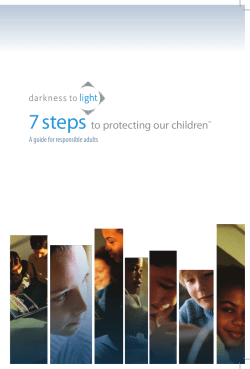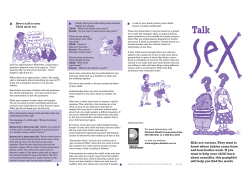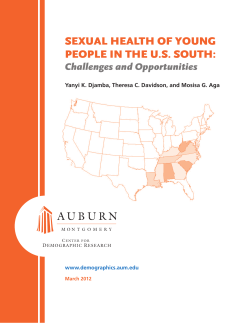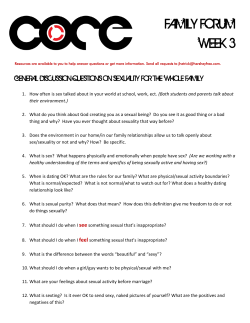
Preventing Sexual
The Myths of Violence MYTH: Battery against women is a rare and isolated occurrence. FACT: Every 15 seconds a woman is battered. Battery is the single major cause of injury to women. Three to four million women are battered each year. MYTH: Women like the abuse or they would leave. FACT: No woman likes the degradation and humiliation of a battering relationship. MYTH: Battering occurs mostly in lower income and ethnic families. FACT: Family violence cuts across all race, class and cultural lines. Social service agencies report a higher proportion of lower income women because women of greater means have alternative private services. MYTH: There is no way to break out of an abusive relationship. FACT: Women can free themselves when they discover their own strengths and take advantage of community resources that offer safe and secure environments. WOMAN, Inc. provides the critical legal resources, general support and advocacy that help women help themselves and their children. T C FA MYTH Partial listing of organizations that provide assistance to rape victims. San Francisco State Unit On Campus Services: • University Police Department (24-hrs emergency) 911 • The S.A.F.E. Place (415) 338-2819 • Sexual Harassment Counseling (415) 338-2916 • EROS (415) 338-2325 • Student Health Services (415) 338-1251/1719 • Counseling and Psychological Svcs. (415) 338-2004 Off Campus Services: 24/7 • San Francisco Women Against Rape 647-RAPE • Sexual Harassment Help-line (415) 863-7444 • San Francisco Trauma ReadyRape Treatment Center (415) 437-3000 • W.O.M.A.N. Inc. (415) 864-4722 • National Sexual Assault Hotline 1-800-656-4673 We C.A.R.E. about your safety. The CAMPUS ALLIANCE FOR A RISK FREE ENVIRONMENT program is designed to provide an escort for students, staff, or faculty during the hours of darkness. C.A.R.E employees are carefully screened for dependability, responsibility and good moral character. They will accompany you to your car, class, library, residence halls, or other location near campus. Criminal consequences for sexual violence include imprisonment in state prison. The specific prison terms for sex crimes will be required to register as sex offenders, and will also be entered into an online database. The database of registered sex offenders is publicly available at the websites for the California Attorney General and the United States Department of Justice National Sex Offender Public Registry. Civil consequences of committing acts of sexual violence include possible civil actions being filed against the offender, making the offender subject to restraining orders and/or potentially liable for compensatory and punitive damages to the victim. Preventing Sexual Assault The C.A.R.E. employess also patrol the buildings, secure propped doors, and advise the police of possible criminal activity. The C.A.R.E. employees are dressed in red shirts with the C.A.R.E. letters highly visible. Call (415) 338-7200 for a C.A.R.E. escort. Call 911 or use any blue light campus phone for any emergency or to report suspicious activity. CRIME PREVENTION Criminal Consequences of Sexual Violence San Francisco State University CRIME PREVENTION UNIT SAN FRANCISCO STATE UNIVERSITY POLICE (415) 338-7200 Crime prevention has been defined as the anticipation, the recognition and the appraisal of a crime risk and the initiation of some action to remove or reduce it. EMERGENCY (24 Hours) 911 If you are on the main campus and using a cell phone, dial (415) 338-2222 for the University Police. PATRICK M. WASLEY CHIEF OF POLICE BUSINESS (24Hours) (415) 338-7200 CRIME HOTLINE (415) 338-3030 SAN FRANCISCO STATE UNIVERSITY POLICE www.sfsu.edu/~upd 01/12 S Student Affairs A What is Sexual Assault? Prevention Tips • Sexual Assualt is any unwanted sexual act committed or attempted against a person’s will by dates, spouses, family members, acquaintances or stran gers.Instances can range from obscene phone calls to forced sexual intercourse. The tips in this brochure are designed to increase your odds against sexual assault. The more you know about rape prevention, the better your chances of never becoming a victim. California Law defines rape as sexual intercourse, sodomy or oral copulation accomplished against the victim’s will: • • • By use of force or fear Regardless of the victims gender When the victim is prevented from resisting by alcohol or drugs administered by or with the knowl edge of the offender • When the victim is unconscious to the nature of the act Rape • The majority of all rapes are acquaintance rapes. • Manipulation or coercion as well as physical force used to cause sexual contact are considered sexual assault. • Rape can cause intense feelings of betrayal, shame, fear and a sense of powerlessness. • First, know the facts about rape. Become aware of locations and situations where rape might occur and avoid them. • Consider your alternatives if confronted by a rapist. Practice possible responses so that you can recall them even under the stress of a real encounter. • Carry a whistle or a personal alarm system. If you are attacked. . . Remember, your main concern must always be YOUR SAFETY. No one can tell you whether you should fight back, submit, or resist. IT DEPENDS ON YOU. Keep assessing the situation as it is happening. If one strategy does not work, try another. Possible options are: negotiating, stalling for time, distracting the assailant and fleeing to a safe place, verbal assertiveness, yelling to attract attention, or physical resistance. Your best defense, however is to BE PREPARED—know your options ahead of time. Your safety may depend upon your ability to stay cool and calm. S.F.S.U. Sexual Assault Response Team (S.A.R.T) The University Sexual Assault Response Team (SART) is a campus-wide community-based team appointed by Deputy Chief Parson. The team consists of experienced professionals who have been trained to respond to the needs of an assault or rape victim. The team consists of the University Police Department, Karla Castillo of the SAFE Place, Dr. Yolanda Gamboa of the Student Health Center and Counseling/Psychological Services, Melanie Deal of the Student Health Center and Counseling and Psychological Services, Donna Cunningham of Student Judicial Affairs and Rachel Herrmann of Housing and Residential Services. Preventing Sexual Assault Know the facts about rape. . . What men and Women need to know. . . • Rape is experienced by the victims as an act of violence. It is changing experience. One out of every five adult women has been a victim of forcible rape. (National Victim Center and Crime Victims Research and Treatment Center, 2008) While sexual attraction may be influential, power, control and anger are the primary motives. • Men can be sexually assaulted by other men. • Understand your sexual desires and limits. Be aware of and resist social pressures. • Accept someone's right to say “NO” to sexual advances. It is the behavior that the person is rejecting—not you. • Do not assume: - That “sexy” clothes means inviting sexual contact. - That previous sexual contact means your partner can not say “NO” this time. - Spending money on a date gives you the right to have sex. • Understand your sexual desires and limits. Believe that you have the right to set those limits. • Communicate your limits in an assertive manner. Be direct and firm about what you do and do not want. • Be aware of your surroundings. If you feel unsafe, you probably are. • Avoid excessive use of alcohol or drugs.They interfere with clear thinking and effective communication. • You can help your friends stay safe. • Rape can happen to anyone. Students, working women, wives, mothers, children, grandmothers, and men have been victims of rape. • Rape can occur anytime and anyplace. Many rapes occur during the day and in the victims’ homes. By some estimates, over 80% of rape victims know their attackers. The rapist may be a relative, friend, coworker, date or other acquaintance. • It is estimated that 1 in 5 women will be raped in her lifetime. Because of low reporting rates, it is not known how many adult men are assaulted. It is also estimated that 1 out of every 3 girls, and 1 out of every 6 boys are sexually assaulted in some way before they reach adulthood. Rape is the most frequently committed violent crime in this country. • Rape is one of the most under reported crimes. The majority of rapists continue until caught, so report any kind of sexual assault. If you are the victim of rape. . . • Go to a safe place immediately and call the 911, a rape crisis center, doctor, friend or relative. The sooner you make the report, the greater the chances the attacker will be caught. • Do not wash, douche, change clothes or clean up in any way until after talking to the police and going to the hospital. You could destroy valuable evidence for court use. • Remember, you are the victim. You have nothing to feel guilty or ashamed about. You may want to contact a treatment or crisis center to help you deal with the consequences of the assault.
© Copyright 2025





















